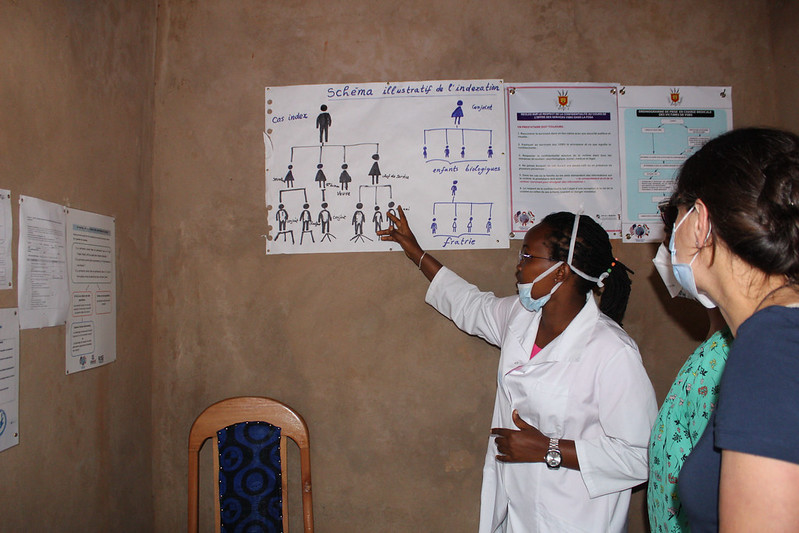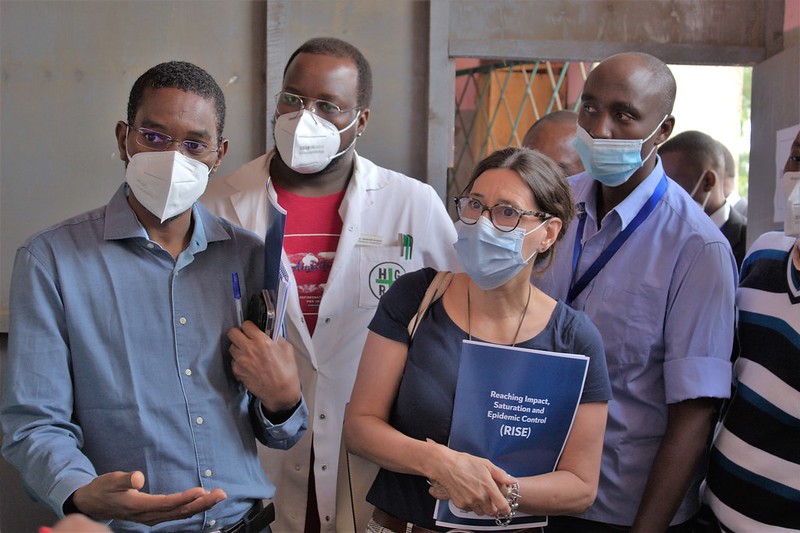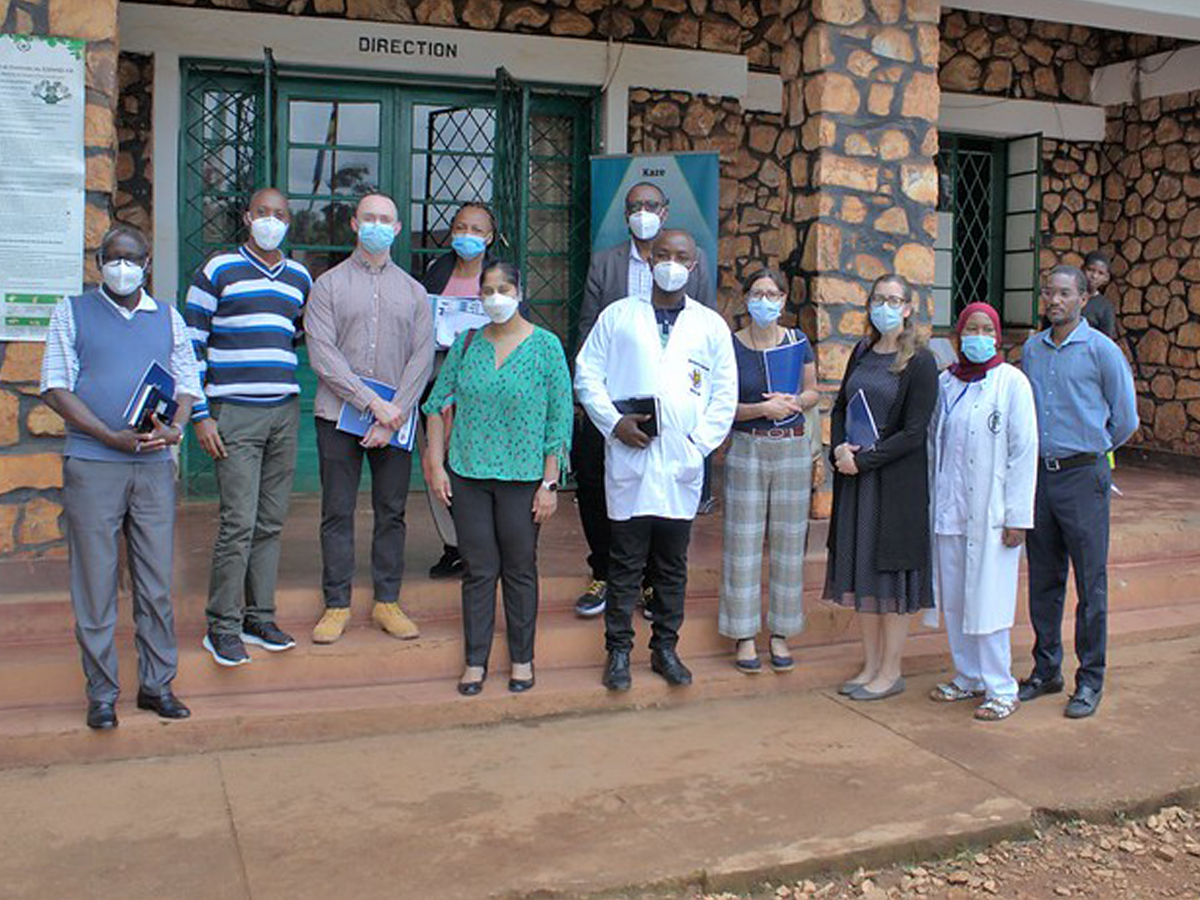Through the Reaching Impact, Saturation, and Epidemic Control (RISE) project, ICAP supports the Gitega Regional Hospital, the SWAA Gitega HIV Clinic, and the Ngozi Regional Hospital in Burundi. On March 29 and 30, 2022, Rachel Golin, MD, PEPFAR chair for Burundi from the Office of the U.S. Global AIDS Coordinator (OGAC), joined a team visit to three ICAP-RISE supported health facilities to understand the contribution of the project in supporting Burundi achieving equitable epidemic control.
Together with Reshma Bhattacharjee, MD, senior surveillance and epidemiology advisor for USAID, Dr. Golin visited the three ICAP-supported facilities to assess the best practices, challenges, and outstanding needs related to direct HIV service delivery at these facilities.
Dr. Golin and Dr. Bhattacharjee were also joined by PEPFAR Burundi staff, including Marouf Balde, MD, MPH, senior HIV advisor, Vinayak Pooja, MS, public health analyst, Marion McGowan, Evelyne Baramperanye, Jeremie Biziragusenyuka, MD, HIV program manager, Franck Kavabushi, MD, clinical services specialist, Apollinaire Kavungerwa, monitoring, and evaluation specialist.

The visiting delegation observed the management of person-centered, differentiated HIV services and support each facility offers, from out-patient HIV testing to data management and filing, as well as laboratory and pharmacy interactions between the clinics and patients.
The PEPFAR delegation also interacted with health care providers, who demonstrated program tools and reports and how data clerks triangulate data from the HIV electronic medical record systems.
Since 2020, ICAP, through RISE, has helped almost 6,000 Burundians become aware of their HIV status – 97 percent of these people are on antiretroviral therapy (ART).

“Burundi has made impressive progress towards reaching epidemic control and has been successful in scaling up targeted HIV testing services, including index testing, and ART treatment initiation for all those who test positive for HIV, and community ART dispensing models,” said Greet Vandebriel, MD, ICAP RISE technical director for Burundi. “Though challenges remain with HIV care and treatment for children, treatment continuity, and viral load coverage, we hope to address any gaps with RISE support.”
Dr. Golin applauded the staff of the Ngozi Regional Hospital laboratory for uninterrupted services for routine viral load and early infant diagnosis services. However, she recommended that the hospital accelerate six multi-month (6MMD) dispensing of ART, strengthen appointment management, and track patients who miss appointments. Dr. Golin also advocated increasing HIV prevention strategies, primarily through Pre-Exposure Prophylaxis (PrEP medication) for high-risk populations. Dr. Golin also suggested that facilities roll out differentiated service treatment models for established patients and patients with non-communicable diseases.
“Burundi is at the brink of achieving HIV epidemic control,” said Dr. Golin. “At this stage, Burundi is well-positioned to strengthen prevention strategies to maintain the achievements made.”
About RISE in Burundi
RISE is a five-year global project funded by the U.S. President’s Emergency Plan for AIDS Relief (PEPFAR) and the U.S. Agency for International Development (USAID). RISE works with countries to achieve a shared vision of attaining and maintaining epidemic control, with local partners capable of managing and achieving results through sustainable, self-reliant, and resilient health systems. ICAP RISE support in Burundi involves mentoring health care workers on partner elicitation and testing, continuity of treatment support through home visits and adherence counseling, facilitation of patient support groups, monitoring and managing viral load counts in patients, and swift return of results to patients.
About ICAP
A major global health organization that has been improving public health in countries around the world for nearly two decades, ICAP works to transform the health of populations through innovation, science, and global collaboration. Based at Columbia Mailman School of Public Health, ICAP has projects in more than 30 countries and is working side-by-side with ministries of health and local governmental, non-governmental, academic, and community partners to confront some of the world’s greatest health challenges. Through evidence-informed programs, meaningful research, tailored technical assistance, effective training and education programs, and rigorous surveillance to measure and evaluate the impact of public health interventions, ICAP aims to realize a global vision of healthy people, empowered communities, and thriving societies. Online at icap.columbia.edu








